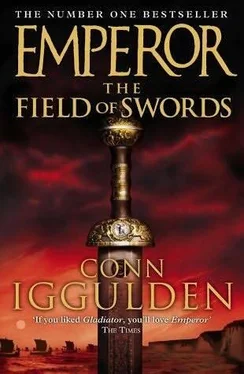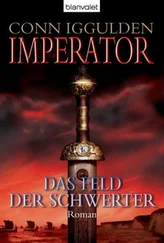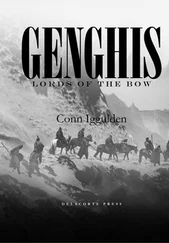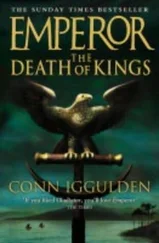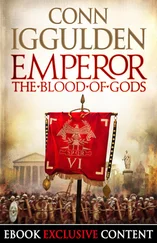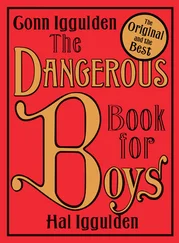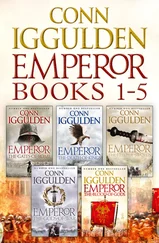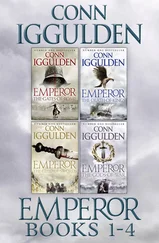Their soldiers stood out, wearing some sort of dark leather armor. They moved amongst the crowd, calling to those who stepped too close to the river. Julius watched as one drew a blade and used the flat to clear a space for the boat they were bringing through. It was a chaotic scene and Julius could hear the notes of a tune carry over the cool air, the musician hidden from view in the mass.
The Helvetii lowered the boat with a rhythmic chanting and held it steady in the shallows while a team of rowers took their places. Even with three men to a side, Julius saw they would have to work hard against a current that threatened to sweep them downriver. The idea of an invasion to follow it was ludicrous, and there was no tension amongst the Romans who watched them.
Even a rough estimate by centuries was impossible. Julius had been told the Helvetii had burnt their land behind them to come south, and he didn’t doubt it. Unless they could be stopped, their path lay right through the narrow Roman province at the base of the Alps.
“I have never seen such a migration,” Julius said, almost to himself.
The Roman officer at his side glanced at him as he spoke. He had welcomed the legions Julius brought with him, especially the veterans of the Tenth. Some of those in the trading outpost had resented the shift in authority that Caesar had brought, but for others it was like a sudden immersion in the energy of their old city. When they talked amongst themselves, it was with restrained glee and a new confidence in their dealings. No more would they have to suffer the scorn of Gaulish merchants and know they were tolerated but never accepted. With only one legion, the outpost was barely acknowledged by Rome, and without the trade in wine, the province might have been abandoned completely. Those who still dreamed of promotion and a career welcomed Caesar with open arms, and none more so than their commander, Mark Antony.
When Julius had presented him with the orders from the Senate, the general could not help the slow grin that spread across his face.
“At last we will see action, then,” he had said to Julius. “I have written so many letters and I was beginning to lose hope.”
Julius had been prepared for dismay, even the threat of disobedience. He had come into the Roman town with a face like thunder to impose his will, but at this response, the tension had vanished and he had laughed aloud at Mark Antony’s honest pleasure. They weighed each other up and both men found something to like. Julius had listened in fascination to the general’s summary of the region and the uneasy truce with local tribes. Mark Antony held nothing back of the problems they faced, but he spoke with a deep insight and Julius had included him immediately in his councils.
If the others resented the sudden rise of the new man, it did not show. Mark Antony had been in the province for four years and painted a detailed picture of the web of alliances and feuds that were the mire of trade and the bane of efficient administration.
“It is not so much a migration as a march of conquest, sir,” Mark Antony said. “Any smaller tribe will lose its women, its grain, everything.” He was in awe of the man Rome had sent, but he had been told to speak freely and he enjoyed the new status it had given him, especially amongst his own men.
“Then they cannot be turned?” Julius asked, watching the shifting mass on the far shore.
Mark Antony looked down from the rampart to where the legions were arrayed in full battle order. A pleasurable shudder touched him at the thought of the strength represented in those squares. As well as the ten thousand men Julius had brought, another three legions had been summoned from the north of Italy. As nothing else could, it demonstrated the new power Julius had been granted that he had only to send riders carrying copies of his orders for them to return with fifteen thousand soldiers at a forced march over the Alps.
“If they are turned, they will starve to death this winter, sir. My scouts reported four hundred villages in flames, with all their winter grain. They know they cannot go back and they will fight all the harder as a result.”
Brutus reached the platform behind them, letting Cabera down onto it so that he could grip the wooden railing with his good arm and watch the proceedings. Brutus saluted as he approached Julius, more than usually conscious of the appearance of discipline in front of the newcomer. He could not be said to like Mark Antony, exactly. Something about the way he seemed so completely in accord with Julius’s aims and ambitions struck a false note with Brutus, though he had said nothing rather than have it interpreted as jealousy. In fact, he felt a touch of that very emotion at seeing the two men talking as easily as old friends while they watched the army of the Helvetii on the far bank. Brutus frowned as Mark Antony made a humorous comment about the vast host and both he and Julius appeared to be trying to outdo the other in studied casualness.
It did not help that Mark Antony was such a big, hearty man, the sort that amused Julius on the rare occasion that he found them. Brutus knew Julius enjoyed nothing as much as the booming laugh and courage of men like his uncle Marius, and Mark Antony seemed to fit that type as if he had known the man personally. He stood a head taller than Julius and his nose shouted to the world that he was a man of ancient Roman blood. It dominated his face under heavy brows, and unless he was laughing, in repose he looked naturally stern and dignified. At the slightest prompt, he would mention his family line, and Mark Antony seemed to believe he was of noble blood simply by the number of ancestors he could name.
No doubt Sulla would have loved the man, Brutus thought irritably. Mark Antony was full of the things that could be achieved now Julius had arrived, yet somehow he had not managed to do any of them on his own. Brutus wondered if the noble Roman realized what Julius would have achieved in his place, one legion or not.
Putting these thoughts aside, Brutus leaned on the railing himself and looked out as the boat approached the Roman side and the oarsmen leapt out into the shallow water to drag it clear of the river.
They stood in the very shadow of the wall the Romans had built to stop them. Even with their numbers,
Brutus didn’t think they would try to break the Roman line.
“They must see we could sink every boat with spears and stones before they can land. It would be suicide to attack,” Julius said.
“And if they go in peace?” Mark Antony asked, without taking his eyes from the messengers that stood aside from their oarsmen below.
Julius shrugged. “Then I will have demonstrated Roman authority over them. One way or another, I will have my foothold in this country.”
Brutus and Cabera both turned to look at the man they knew and saw a savage pleasure in his face as he stood tall on the rampart to hear the words of the Helvetii.
They had seen a similar expression when Mark Antony had addressed the first council of generals months before.
“I am glad you are here, gentlemen,” Mark Antony had said. “We are about to be overrun.”
Julius had wanted a wild land to win, Brutus thought to himself. The Helvetii were only one of the tribes in that region, never mind the entire country that Julius dreamed of taking for Rome. Yet the dark moods of Spain could never be imagined in the man who stood with them on the ramparts. They could all feel it and Cabera closed his eyes as his senses were cast loose against his will into the tumbling roads of the future.
The old man slumped and would have fallen had Brutus not caught him. No one else moved as the messengers spoke and Julius turned to his interpreter to hear the words in halting Latin. Out of sight of the riders, he grinned to himself, then stood to face them, both hands on the wide railing.
Читать дальше
Конец ознакомительного отрывка
Купить книгу
